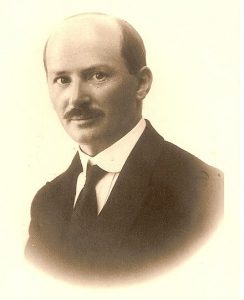Israel Dushman
 Born in 1884, in Vilna, Lithuania and died on July 14, 1947, in Tel Aviv. He was a Hebrew poet, songwriter, author, translator and teacher.
Born in 1884, in Vilna, Lithuania and died on July 14, 1947, in Tel Aviv. He was a Hebrew poet, songwriter, author, translator and teacher.
He was born in 1884, to Shaul Aharon and Batsheva in Vilna which was then part of the Russian Empire. He studied at a 'heder,' a yeshiva, and attended general studies. |He abandoned religion; and in 1905 made Aliyah to Eretz-Israel. He was among the first to teach Hebrew in schools. He initially taught in the Galilee, in the communal settlements of Rosh Pina and Metula, and when the first Hebrew high schools opened in the country - the "Herzliya Gymnasium" - he was one of its first to teach language and literature subjects in Hebrew. Dushman was a high school teacher until he died.
Dushman also contributed to the Hebrew theater; and was one of the founders of the "Hebrew Stage Lovers Association." He translated more than fifty plays from world literature, mostly from Russian, and was privileged to see them performed on stage. He is one of the founders of Hebrew children's new literature in the country, and wrote many poems, rhyming stories, adventure stories and translations. His songs, which later were rendered as musical tunes, became very famous, and are sung in Israel to this day. Among them are especially famous: "Po Be'eretz Chemdat Avot,"(Here in the Land Beloved by our Forefathers) "HaHalutzim," (The Pioneers), and "Hashkediyah Porachat," (The Almond Tree is Blooming). He is considered one of the pioneers of Hebrew song innovators in the country.
The story of the song "Po Be'eretz Chemdat Avot " demonstrates how, in those years, the songs of the Second Aliyah were produced: In 1912, the students of the Herzliya Hebrew Gymnasium went on a trip to the north of the country. The director of the gymnasium, Dr. Bograshov, turned to Dushman and Hanina Karczewski, the music teacher, and asked them to write together a marching song the students could sing together during their trip around the country. They chose the well-known Yiddish poem the "Galut March" written by Maurice Rosenfeld to lyrics by the composer Herman Zvi Erlich, and to this melody Dushman composed words in stark contrast to the Yiddish song's words of despair and sadness. The song became known country-wide , and even reached the Diaspora; but in the Diaspora it was sung under the title: "Po Be'eretz Chemdat Avot."
Many attribute to him the writing of the lyrics of the well-known children's song "Yonatan HaKatan," (Little Jonathan), but some also believe that the song was written by the teacher Shoshana Częstochowska. This is how songs were produced during the Second Aliyah period: functional lyrics adapted to a familiar melody.
Most of his stories and poems were published in the Hebrew children's press, in the newspapers: "Davar leYeladim," "Alumot." and "Itoneinu." He self-published several series of children's stories, such as "Rimonim LeYeladim," (Pomegranates for Children), "Rimonim LeNoar" (Pomegranates for Youth), and "Sifria LeYeladim" (Children's Library). His translation of "Pinocchio," one of many translations of the story by the Italian writer Carlo Collodi, was also received with great love by generations of young Hebrew readers.
Israel Dushman had a heart attack and died in in Tel Aviv in 1947. He was buried in the Nahalat Itzhak cemetery. He is survived by his wife, Leah )née Carmine(, a son (Reuven), and two daughters (Ofra and Shulamit). A street in the Neve Zeev neighborhood of Be'er Sheva is named after him.
Source: Wikipedia [Hebrew]

